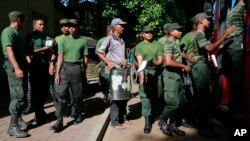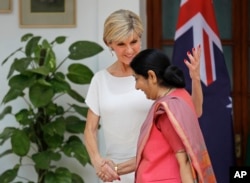Australia is contributing funds to help Sri Lanka combat its worst outbreak of dengue fever, which has claimed 250 lives and infected nearly 100,000 people so far this year in the Indian Ocean island nation.
Visiting Foreign Minister Julie Bishop said Wednesday night that Australia is giving $475,000 Australian (US $377,000) to the World Health Organization to implement immediate dengue prevention, management and eradication programs in Sri Lanka.
Sri Lanka’s hospitals are overcrowded with patients, and the government has deployed soldiers, police and health officials to inspect houses and clear rotting garbage, stagnant water pools and other potential mosquito-breeding grounds across the country. Health officials blamed the public for their failure to clear puddles and piles of trash after last month’s heavy monsoon rains.
The number of infections nationwide is 38 percent higher than last year, when 55,150 people were diagnosed with dengue and 97 died, according to the Health Ministry. Cases were concentrated around the main city of Colombo, though they were occurring across the tropical island nation.
Bishop is on a two-day visit and will meet Thursday with government leaders.
She said Australia is offering an additional $1 million (US $795,000) for a research partnership between Australia’s Monash University and Sri Lanka’s Health Ministry to test the introduction of naturally occurring Wolbachia bacteria to eradicate dengue fever from Sri Lanka.
She said the bacteria “prevent transmission of dengue virus between humans’’ and that it has shown success during the last six years in countries such as Brazil, Columbia, Australia, India, Vietnam and Indonesia where it was piloted.
The bacteria have the ability to block other mosquito-borne diseases such as Zika and Chikungunya, the Australian embassy said in a statement.





